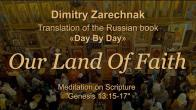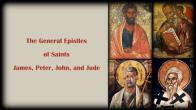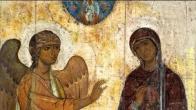ABOUT ORTHODOXY
You are here
The Parable of the Mustard Seed
We encounter the parable of the mustard seed in three of the Evangelists: Matthew (13:31-32), Mark (4:30-32) and Luke (13:18-19). Here is how the Evangelist Matthew tells it:
The kingdom of heaven is like to a grain of mustard seed, which a man took, and sowed in his field: which indeed is the least of all seeds: but when it is grown, it is the greatest among herbs, and becometh a tree, so that the birds of the air come and lodge in the branches thereof (Matthew 13:31-32).
In this parable it is necessary to understand that Christ is comparing the Kingdom of Heaven not with the mustard seed, which is insignificant in size (among the Jews of that time there was a saying: "Small as a mustard seed"), but with the ultimate process of its growth, when it turns into a big, bushy tree, in whose branches flocks of birds find shelter. Birds are a metaphor that stands for the people of God, who will find shelter (be saved) in the Church of Christ which was to be founded. The mustard seed, in appearance dead and insignificantly small the least of all seeds, in the words of the parable is a symbol of the mystery of the resurrection from the dead. We shall tell about all this in more detail a little later.
Jesus Christ spoke the parable of the mustard seed immediately after the parable of the tares. This was not by chance, for they are tied together. In the parable of the sower it is said that of all the seed sown, three parts perish, and only the fourth part comes up (is saved); the parable of the tares explains that from the tares a great danger threatens even this fourth part of sown seed. On listening to these parables, the disciples might have come to despair because of such a small number of people for whom the way to salvation would be open. That is why the Lord offers them also the parables of the mustard seed and the leaven (we shall speak of the latter next time). This seed, being the least of all seeds, when it comes up becomes the greatest among herbs, and becometh a tree, so that the birds of the air come and lodge in the branches thereof. The very same thing will happen with the Christian preaching as well. Although the disciples of Christ were powerless according to human understanding, yet the power concealed in them was great, and the preaching of the Gospel spread throughout the whole world.
Concerning this, Blessed Jerome writes thus: "The preaching of the Gospel is the least of all teachings. In the very beginning it seems improbable: It preaches man and God, a God Who dies, and the scandal of the Cross. Compare this teaching with the tenets of the philosophers, with their books and brilliant oratory, with the composition of their speeches," writes Jerome, "and thou shalt see how the seed of the Gospel is the least of all these seeds. But this (the teaching of the philosophers V.P.), while penetrating deeply at first, does not give life; on the contrary it grows weak and becomes exhausted, and dries up like grass. But the Good Tidings, while seemingly small, upon being sown in the soul of the believer or in the whole world, take root like a powerful tree."
The Kingdom of God, the Kingdom of Christ on earth or the Church of Christ, which at first was quite small and barely noticeable, like the mustard seed, grew. The Church of Christ is always contemporary and contains within itself a multitude of peoples, just as flocks of birds are sheltered in the branches of the mustard tree.
In such hot countries as Judea, the mustard tree attains huge proportions. It differs greatly from mustard plants of other countries of the world, which attain only the height of an ordinary shrub. A man on a horse can ride under its branches; large furnaces are fueled by its boughs; flocks of birds sit on its branches, and its branches do not break under the weight of a man. The seeds of the mustard tree were considered medicinal and for this reason the plant itself was widely known.
Christ Himself is the mustard seed and the Sower. In Him Alone, as in a seed itself, the whole Church was originally contained, and from Him it spread throughout the whole world. Christ is the one, eternal Head of the Church; without Him there would not be a Church. Christ is the Sower as well, who willingly gave Himself over to death and through this death gave life to His Church to all who believe on Him. He Himself said of Himself: Except a corn of wheat fall into the ground and die, it abideth alone: but if it die, it bringeth forth much fruit (John 12:24).
Indeed, Christ was the little seed in the eyes of men. He was born in Judea, a land remote and insignificant in political terms; for thirty years he lived in obscure Nazareth, in despised Galilee, in the home of a carpenter; by His teaching he attracted unto Himself a few disciples from simple fishermen and publicans; and finally, having given Himself over into the hands of enemies, he died a shameful death on the cross. But He resurrected, ascended to the Father, and His Church spread throughout the whole earth, like a great tree. In Him the ancient prophecy of Ezekiel came to pass: I will also take of the highest branch of the high cedar, and will set it; I will crop off from the top of his young twigs a tender one, and will plant it upon an high mountain and eminent: in the mountain of the height of Israel will I plant it: and it shall bring forth boughs, and bear fruit, and be a goodly cedar: and under it shall dwell all fowl of every wing; in the shadow of the branches thereof shall they dwell (Ezekiel 17:22-23).
So then, from Christ, as from a mustard seed, His Holy Church spread throughout the whole world through a handful of unlearned apostles. The same process takes place in the soul of a man who has responded to the teaching of the Gospel: the grace of God, which at the beginning acts in a manner barely noticeable for a man, in conjunction with his (the man's) efforts, gradually envelopes his whole soul, perfecting it and making it a "temple of God". The action of the Gospel teaching is similar to the mustard seed, and Clement of Alexandria writes: "It stings the soul with benefit for us"; that is, the commandments of Christ at first seem bitter and unpleasant for our heart which is attached to sin, but when we decide to fulfill them, they become healing and saving, for they renew and transfigure our hearts.
Venerable Isaiah writes: "…it is fitting for us to imitate the properties of this seed. When Scripture calls it the very least of all seeds, then by this it shows that we must love humblemindedness, considering ourselves lower than everyone, and have meekness and longsuffering. Its red (ruddy) color means modesty and chastity, so that we would not allow in our flesh anything depraved. Its sharpness signifies hatred for the passions and the vanities of the world. And that its sharpness is not otherwise revealed than when it is crushed and grated by this it demonstrates that virtue does not bring any kind of benefit, if in cultivating it we do not bear labors and afflictions. So then, in accordance with the image of this seed let us examine ourselves: Are we like it in humbleness of heart, meekness of soul, fervency of love?"
The mustard seed produces warmth. So also the grace filled word of God, received by the heart, warms it. Luke and Cleopas, the two disciples of Christ, experienced in themselves such a grace filled warmth on the way to Emmaus, when they said with amazement: Did not our heart burn within us, while he talked with us by the way (Luke 24:32). Mustard produces an urge for food, while the word of God arouses in the soul a hunger for the Heavenly Bread, a thirst for salvation and justification in Christ the Saviour.
The Lord speaks even more fully and clearly about this saving effect of His teaching on our heart in the quite short parable of the leaven.
©V. Potapov
PARISH LIFE
Address of our Cathedral
Subscribe to our mailing list
While all the materials on this site are copyrighted, you may use them freely as long as you treat them
with respect and provide attribution on the Russian Orthodox Cathedral of St.John the Baptist of Washington DC.









